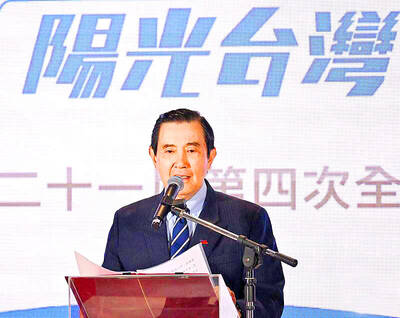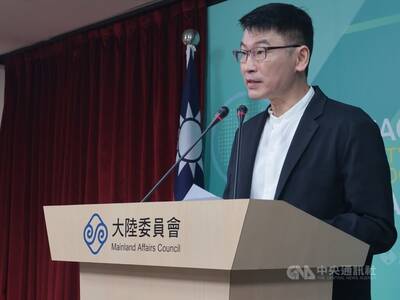Chinese spouses of Taiwanese, accompanied by members of a social activist group, filed a protest yesterday against what they called "declining human rights" in Taiwan.
Several Chinese spouses said at a news conference at the National Immigration Agency that unreasonable policies -- including the interview policy upon arrival, a long waiting period for citizenship and restrictions on working -- have made their lives difficult.
Members of the Chunghua Cross-Strait Marriage Consultation Association, which called the news conference, asked the government to respect the rights of Chinese spouses.
They said that since the government opened the door to cross-strait marriages in 1987, Chinese spouses have endured discrimination.
For example, the Mainland Affairs Council proposed in 2002 that the waiting period for Chinese spouses to obtain Republic of China (ROC) citizenship be extended from eight years to 11 years, although the proposal was later dropped, they said.
The council then imposed a quota system for their citizenship application, they said.
The government also launched an interview policy in recent years to screen Chinese spouses with questions that were considered to infringe upon their privacy, the group said.
In June, the Ministry of the Interior published a demographic white paper that reduced quotas for Chinese spouses settling in Taiwan, they said.
Since Sept. 1, Chinese spouses intending to enter Taiwan after marriage have been required to produce health certificates from state-run hospitals, licensed private hospitals or university-affiliated hospitals and certified by a Chinese notary agency, they said.
The clean bill of health must then be certified by the Straits Exchange Foundation to prove the document's validity, they said.
The association said that of the 250,000 Chinese spouses living in Taiwan only about 30,000 have ROC identity cards.
In response, the National Immigration Agency said it would conduct a thorough review to address the grievances.
Regarding a suggestion by association members that the agency revise the regulations on the interview system and the waiting period, the agency said that draft revisions were sent to the Executive Yuan for approval in October.
On the provision of a financial statement, officials said that all Chinese spouses of Taiwanese nationals have to be interviewed, but the requirement to provide a financial statement is decided on a case by case basis.
They said that when Chinese spouses enter Taiwan, they do not have work permits issued by the Council of Labor Affairs, meaning that Taiwanese nationals have to provide their living expenses.

‘ANGRY’: Forgetting the humiliations and sacrifices of ‘the people of the Republic of China’ experienced disqualified Lai from being president, Ma Ying-jeou said Former president Ma Ying-jeou (馬英九) yesterday criticized President William Lai (賴清德) over what he called “phrasing that downplayed Japan’s atrocities” against China during World War II. Ma made the remarks in a post on Facebook on the 80th anniversary of the end of World War II. Ma said he was “angry and disappointed” that Lai described the anniversary as the end of World War II instead of a “victory in the war of resistance” — a reference to the end of the Second Sino-Japanese War (1937-1945). The eight-year war was a part of World War II, in which Japan and the other Axis

The Mainland Affairs Council (MAC) yesterday announced a ban on all current and former government officials from traveling to China to attend a military parade on Sept. 3, which Beijing is to hold to mark the 80th anniversary of the end of the Second Sino-Japanese War. "This year marks the 80th anniversary of the end of World War II and the Republic of China’s victory in the War of Resistance [Against Japan]," MAC Deputy Minister and spokesperson Liang Wen-chieh (梁文傑) told a regular news briefing in Taipei. To prevent Beijing from using the Sept. 3 military parade and related events for "united

‘OFFSHORE OPERATIONS’: Also in Dallas, Texas, the Ministry of Economic Affairs inaugurated its third Taiwan Trade and Investment Center to foster closer cooperation The 2025 Taiwan Expo USA opened on Thursday in Dallas, Texas, featuring 150 Taiwanese companies showcasing their latest technologies in the fields of drones, smart manufacturing and healthcare. The Taiwan External Trade Development Council (TAITRA), the event’s organizer, said the exhibitors this year include Hon Hai Precision Industry Co (Foxconn), the world’s largest contract electronics manufacturer; AUO; PC brand Asustek Computer; and drone maker Thunder Tiger. In his opening speech, TAITRA chairman James Huang (黃志芳) said he expected Texas to become a world-class center for innovation and manufacturing as US technology companies from Silicon Valley and Taiwanese manufacturers form an industrial cluster

A 20-year-old man yesterday evening was electrocuted and fell to his death after he climbed a seven-story-high electricity tower to photograph the sunset, causing a wildfire on Datong Mountain (大同山) in New Taipei City’s Shulin District (樹林), the Taoyuan Police Department said today. The man, surnamed Hsieh (謝), was accompanied on an evening walk by a 20-year-old woman surnamed Shang (尚) who remained on the ground and witnessed the incident, capturing a final photograph of her friend sitting atop the tower before his death, an initial investigation showed. Shang then sought higher ground to call for help, police said. The New Taipei